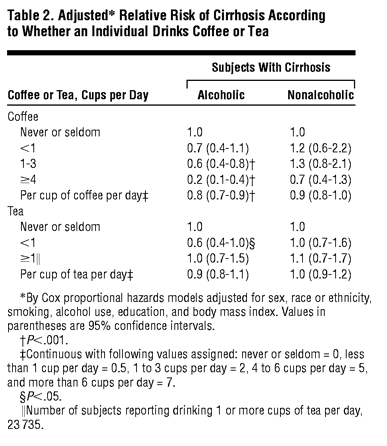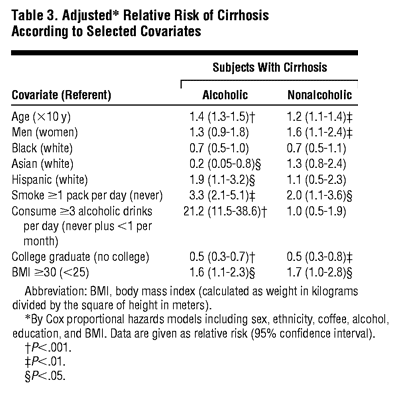[quote name='ЮЮЮ' post='12035935' date='22.02.2010, 21:15']На протяжении двух лет ходила по врачам на счёт своего гепатита С, то к Салову то к Польговой, но про кофе не кто из них не говорил...?
[/quote]
к сожалению наши врачи не владеют последней информацией. к тому же не основное лечение, а просто полезная вещь при гепатитах. если знаете английский язык, поищите в инете результаты концеренций.
да вот вам, почитайте:
[quote]57th Annual Meeting of the American Association
for the Study of Liver Diseases
(AASLD)
October 27-31, 2006
Boston, MA
Coffee Appears to Reduce Risk of Fibrosis in HCV+
Reported by Jules Levin
AASLD, Oct 27-31, 2006
Boston, MA
"IMPACT OF CAFFEINE CONSUMPTION ON HISTOLOGICAL ACTIVITY IN PATIENTS WITH CHRONIC ACTIVE HEPATITIS C"
Reported by Jules Levin
AASLD, The Liver Meeting
Oct 27-31, 2006
Boston, MA
C. Hezode1, 3; C. Costentin1; F. Roudot-Thoraval2, 3; F. Medkour1; E. Zafrani4;
J. Pawlotsky3, 5; D. Dhumeaux1, 3; A. Mallat1 1. hepatology, hopital henri mondor, creteil, France.
2. public health, hopital henri mondor, creteil, France.
3. INSERM U635, hopital henri mondor, creteil, France.
4. pathology, hopital henri mondor, creteil, France.
5. virology, hopital henri mondor, creteil, France.
It has recently been suggested that caffeine consumption is associated with a lower risk of elevated serum alanine aminotransferase (ALT) activity in patients at high risk for liver disease, cirrhosis in subjects with excessive alcohol intake, and a lower incidence of chronic liver disease.This effect might be attributed to antioxydant properties of caffeine. Thus, the aim of this study was to evaluate the impact of caffeine consumption on histological activity and ALT levels in patients with chronic hepatitis C.
237 consecutive naïve patients with histologically proven chronic hepatitis C were included, who had not previously received HCV therapy. They did not have HBV or HIV coinfection, nor did any have liver transplant.
Data collected included demographics, route of transmission, daily consumptions of alcohol, tobacco, caffeine during the 6 months preceding liver biopsy, body mass index, genotype, ALT level at the time of liver biopsy, steatosis and activity grades, as well as fibrosis stage, according to METAVIR.
Daily caffeine consumption was estimated as the sum of mean intakes of coffee, tea and caffeine-containing sodas. Patients (153 men, 84 women, mean age: 45.4years) were classified into 4 groups according to caffeine consumption.
As shown in the table, there was a significant inverse relationship between activity grade and daily caffeine consumption, p<0.001 (test for linear trend). However, no relationship was found between daily caffeine consumption and ALT level.
In multivariate analysis, caffeine intake greater than 407 mg/day (3cups) predicted a lesser risk of moderate-marked activity grade (OR=0.473 (0.257-0.871)). Of interest, individuals who drank greater than 407 mg/day of coffee also smoked more tobacco & cannabis. Drinking 408 to 679 mg daily appeared to reduce risk for fibrosis even more, and drinking >679 mg daily appeared to reduce risk the most.

Other factors independently associated to activity grade included moderate-severe steatosis (OR=3.2 (1.49-7.4)), age greater than 40 years (OR=2.13 (1.12-4.05)) and ALT level (OR=1.02 (1.01-1.03).
In conclusion, caffeine consumption appears to have a positive impact on histological activity in patients with chronic hepatitis C.

 Войти
Войти Регистрация
Регистрация

 Тема закрыта
Тема закрыта


 Наверх
Наверх



